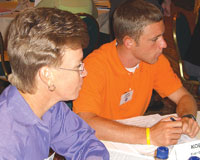NCAA News Archive - 2006
« back to 2006 | Back to NCAA News Archive Index
|
The NCAA News
DALLAS — The Division II Student-Athlete Advisory Committee ran straight to the tough issues during its annual summit with the Division II Management Council.
The primary topics during the July 15-16 meeting were skill instruction and the use of male practice players for women’s teams — a pair of issues that have vexed the overall membership for years.
The discussion about skill instruction was based on 2006 Convention Proposal No. 34, proposed legislation from the Presidents Council that would have permitted student-athletes and coaches in sports other than football to engage in up to two hours of skill instruction per week outside of the playing season. The proposal was defeated, 103-152-3, but the Mid-America Intercollegiate Athletics Association and the Sunshine State Conference recently submitted the same proposal verbatim for the 2007 Convention.
The interaction between the Management Council and the student-athletes revealed the same issues that were present at the 2006 Convention: The student-athletes generally welcome at least limited skill instruction in the off-season, the administrators (especially the faculty members) worry about how year-round practice encroaches on the traditional student experience and everybody has trouble drawing the line on where skill instruction ends and outright practice begins.
The session did shake loose one fresh concept. Rather than breaking it down with six hours of conditioning and two hours of skill instruction, some athletes and administrators considered the concept of six hours of conditioning, one hour of practice and one hour of skill instruction per week.
SAAC Chair Megan Burd of Wheeling Jesuit University said that approach seemed "very creative" and said that it and other concepts would be discussed further at the November SAAC meeting.
The Management Council also discussed the topic at its July 17-18 meeting. Division II Presidents Council Chair Charles Ambrose said the Council may be reluctant to support the exact proposal that was voted down rather decisively at the most recent Convention.
At least one of the sponsoring conferences is expected to review the proposal to determine if adjustments could improve the legislation. Alternative legislation from the governance structure, however, likely would not be available until the 2008 Convention.
Male practice players
As for male practice players, the discussion mirrored that of the membership in general: Some of the participants thought that the practice is a prima facie loss of opportunity while others believed that it helps women by better developing their skills.
Mars Hill College Athletics Director David Riggins asserted that now is the time to address the matter.
"If we’re going to deal with it, let’s deal with it now while the issue is as small as it will ever be," he said.
In fact, the Management Council took a step down that path at its subsequent meeting, with a group of members briefly pushing to develop legislation that would ban the practice in Division II. Ultimately, however, the Council agreed to survey the membership on how extensively the practice is used. It will revisit the matter again once that information becomes available.
Burd was pleased with the summit, which has been legislatively required since the Association restructured in 1997.
"It was a great time of interaction," she said. "The administrators and the student-athletes learned a lot from each other about issues that will affect student-athletes over the next several years."
Summit notes:
This was the 10th Management Council-SAAC Summit. Division II Vice President Mike Racy, who has participated in all of them, said the event has played a key role in strengthening the athlete-administrator relationship throughout the membership. "At the beginning, the attitude at these summits was more confrontational," he said, "and there were times when emotions got a little raw. But both sides have committed to greater preparation, and now we have an event where both parties respect each others’ perspective" ... The format for the event changed so that the athletes had more free time during their Thursday and Friday SAAC meetings. The payoff appeared to be more lively discussion at the Saturday and Sunday discussions with the Management Council ... Outgoing staff liaison Kim Ford was recognized for her service to the SAAC. Ford is assuming additional duties in the office for diversity and inclusion ... The student-athletes expressed concern about timing identified in 2007 Convention legislation about hearings for student-athletes facing reduction or loss of financial aid. The proposal leaves it to the institution to set a deadline for the student-athlete’s response. If the athlete requests a hearing, the institution would be required to conduct it within 30 days. Concerns were expressed that the process could disadvantage student-athletes who learn about the loss of aid in July since it would permit them little time to identify an alternative. Further, there was sentiment to make certain that student-athletes are provided enough time to respond to the institution’s notice. A seven-day period, for instance, might not allow for slow mail and the possibility that the student-athlete could have changed addresses.© 2010 The National Collegiate Athletic Association
Terms and Conditions | Privacy Policy

